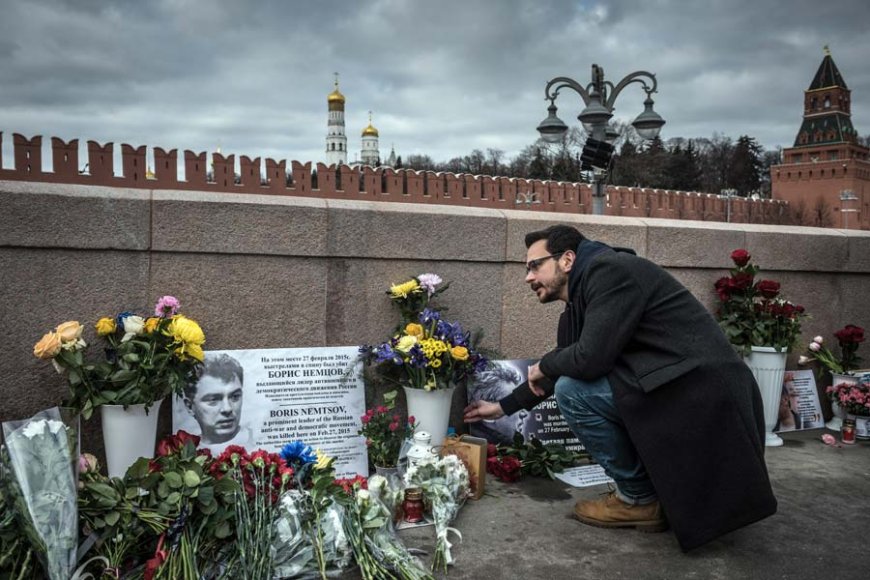Inside Alexei Navalny's Prison Experience: A Chronicle of Struggle and Resilience
Insights from Navalny's Letters and Reflections During His Last Months

Alexei Navalny, imprisoned in chilly concrete cells and often left alone with his books, turned to letters for comfort. In a July letter to a friend, he claimed that nobody could comprehend life in a Russian jail "without having been here," but that attendance was not necessary.
"They'll feed you caviar if they're told to feed you caviar tomorrow," Russian opposition leader Alexei Navalny wrote to Ilia Krasilshchik in August. "They will strangle you in your cell if given the order to do so."
There are still many unanswered questions about his last months and his death, which Russian officials revealed on Friday. It's even unclear where his corpse is.
The aides to Navalny have not spoken anything as they are grieving. However, prior declarations from him and his aides, his court appearances, interviews with close friends, and passages from private letters published with The New York Times by multiple friends—including Krasilshchik—all provide vivid accounts of his last months of life.
The letters show the breadth of ambition, tenacity, and curiosity of a man who inspired the opposition to President Vladimir Putin and who, in the eyes of his followers, will endure as a symbol of their shared fight. They also demonstrate Navalny's difficulties maintaining ties to the outside world despite his large ego and unwavering belief that what he was doing was good.
His letters demonstrate that there was no indication that Navalny had lost his mental acuity, even while the harsh circumstances of jail took their toll on his physically (he was often refused access to medical and dental care).
Claiming to have read 44 English-language books in a year, he was systematically getting ready for what lay ahead, honing his agenda, reading political memoirs, sparring with journalists, giving pals professional advice, and offering his thoughts on trending social media articles that his staff shared.
In public statements, 47-year-old Navalny referred to his imprisonment since January 2021 as a "space voyage." He was more alone than ever by the autumn of 2023, having to spend most of his time in solitary confinement and without the services of three of his attorneys, who had been taken into custody for their alleged involvement in a "extremist group."
He did, however, stay up to date on news. Russian photographer Evgeny Feldman, a friend of Navalny's, revealed to him that the former president of the United States, Donald Trump, had a "very scary" election strategy.
From his high-security jail cell, Navalny wrote, "If President Joe Biden's health deteriorates, Trump will become president." "Does the Democratic Party not find this apparent?"
An Open Life
Because of the odd digitization of the Russian prison system—a holdover from a short period of liberal reform in the midst of Putin's 24-year rule—Navansky was able to transmit hundreds of handwritten messages. For forty cents a page, via a website, anybody could write to him and get scans of his replies, usually a week or two after he wrote them and after they were approved by a censor.

FILE — On November 24, 2023, Palestinians in the southern Gaza Strip town of Khuza'a, close to Khan Younis, return to assess the damage to their houses. Alezei Navalny sent letters from jail on a broad range of subjects, from culinary preferences to the conflict in Gaza, and from book suggestions to the passing of actor Matthew Perry.
Source: The New York Times/Samar Abu Elouf
After they were forbidden from sharing papers, Navalny also interacted with the outside world via his attorneys, who put up paperwork against the glass dividing them. According to a 2022 Navalny article, jail staff had covered the glass with foil at one time.
Subsequently, he had to attend court often to discuss fresh criminal proceedings filed by the state to prolong his jail sentence or grievances filed by Navalny against his treatment. Despite the rubber-stamp character of Russia's legal system, Navalny informed Krasilshchik, a media entrepreneur now living in exile in Berlin, that he found the sessions enjoyable.
He wrote, "They help the time pass faster by distracting you." "They also give a sense of excitement, struggle, and pursuit."
He had the chance to demonstrate his disdain for the system throughout the court hearings as well. At the end of a trial in July that resulted in an additional 19-year term, Navalny called the judge and the court personnel "crazy."
As per his team's published speech, he questioned, "You have one, God-given life, and this is what you choose to spend it on?"
Navalny argued in January at one of his last sessions via video connection that he should be allowed to take longer lunch breaks in order to finish the “two mugs of boiling water and two pieces of disgusting bread” to which he was legally entitled.
The appeal was denied; in fact, interviews revealed that Navalny seemed to enjoy meals only through the eyes of others during his incarceration. He showed interest in the Indian cuisine Feldman had sampled in New York and informed Krasilshchik that he liked doner kebabs more than falafel in Berlin.
The court also rejected his suit on the 300 days or so that Navalny was held in isolation in his prison's "punishment" cells.
Typically, the cells were seven feet by ten feet concrete enclosures that were wet, chilly, and inadequately aired. However, Navalny was opposing a different point of contention: prisoners compelled to stay in their cells were only permitted to read one book.
"I would like ten books in my cell," he said to the judge.
Books Maintained Him
Until the end of his life, Navalny's imprisonment seemed to revolve around books.
Navalny wrote to Krasilshchik in April 2023 to clarify that he would rather read ten novels at once and "switch between them." He said that he had hated memoirs for a long time before coming to enjoy them. However, they're really incredible.
Not only did he provide reading suggestions, but he also often requested them. In a July letter to Krasilshchik, he described jail life and suggested nine books on the topic, including a three-volume series of 1,012-pages written by Soviet dissident Anatoly Marchenko.
In same letter, Navalny also said that he had read "One Day in the Life of Ivan Denisovich" again, the gripping book about Josef Stalin's prison written by Alexander Solzhenitsyn. Navalny said that he had just recently begun to realize the depravity of the labor camps during the Soviet period, having endured a hunger strike and spent months "in the state of 'I want to eat.'"
He stated, "You begin to realize the degree of horror."
Navalny was reading about contemporary Russia around the same time. Liberal Russian journalist and television personality Mikhail Fishman, who is now living and working in exile in Amsterdam, learned via a Navalny staffer that the opposition leader had perused his most recent book about opposition leader Boris Nemtsov, who was slain.
Fishman claimed to have heard that while Navalny enjoyed the book, he thought it was excessively complimentary of the late Russian President Boris Yeltsin.
Fishman countered in a letter to Navalny, claiming that Yeltsin despised the KGB, the infamous Soviet secret police that silenced critics. In response, Navalny expressed his "great outrage" at the assertion.
In his letter, Navalny insisted that Putin's predecessor had failed to alter the Soviet system and that "prison, investigation, and trial are the same now as in the books" of dissidents from the Soviet Union. "I am unable to forgive Yeltsin for this."
However, Navalny also expressed gratitude to Fishman for sharing some information about his Amsterdam life.
He said in a sample that Fishman sent to the Times, "Everyone usually thinks that I really need pathetic and heartbreaking words." "However, I miss the everyday grind a lot—lifestyle, food, pay, and gossip news."
Navalny also corresponded with Kerry Kennedy, a human rights advocate and the daughter of Democratic leader Robert F. Kennedy, who was slain in 1968. A copy of a handwritten, English-language letter that Kennedy shared on Instagram after Navalny's passing states that he informed her he had sobbed "two or three times" while reading a book about her father that a friend had suggested.
A banner with a passage from her father's speech about how a "ripple of hope," multiplied a million times, "can sweep down the mightiest walls of oppression and resistance," was sent to Kennedy, which Navalny praised for sending it.
Navalny wrote, "I hope I'll be able to hang it on the wall of my office one day."
Maintaining Contact
Feldman, a Russian photojournalist who covered Navalny's 2018 presidential bid, was the person who suggested the Kennedy book. Since his detention in 2021, Feldman, who is now living in exile in Latvia, claims to have sent at least 37 letters to Navalny, receiving responses to almost all of them.
In the last communication that Feldman received, dated December 3, Navalny said, "I really like your letters," some of which he shared with the Times. "They cover all the topics I enjoy talking about, including politics, food, elections, scandalous subjects, and ethnicity."
Feldman said that the latter was a reference to their discussions on the Israel-Hamas conflict and antisemitism. In addition, Navalny spoke about how much he had grown to love actor Matthew Perry, who passed away in October. Despite never having seen "Friends," Navalny was touched by an obituary he saw in The Economist.
The December letter concluded with Navalny's reflections on a topic he and Feldman were both interested in: American politics. Navalny ended by cautioning against a Trump administration and posed the question, "Please name one current politician you admire."
Navalny vanished three days after he submitted the letter.
Navalny's exiled associates said that during a chaotic, 20-day hunt, they made over 600 requests to jails and other government offices.
A spokesman for Navalny said on December 25 that the former spy had been discovered in Polar Wolf, a remote Arctic jail.
After his lawyer visited him the next day, Navalny said on social media, "I'm your new Santa Claus." "When I look out the window, I say Oh-oh-oh, not Ho-ho-ho, because there is night, then evening, and then night again."
In the North
In the article, Navalny claimed that he was transported to his new jail, which was categorized as a more severe "special regime" establishment, via a detour across the Ural Mountains.
Navalny was reading books even during his trip. By the time he got to Polar Wolf, he had read all he could carry with him, so he had to choose from the classics in his new prison library: Anton Chekhov, Fyodor Dostoyevsky, or Leo Tolstoy. He wrote this to journalist Sergei Parkhomenko.
"Who could have told me that the most gloomy Russian writer is Chekhov?" In a letter that Parkhomenko posted on Facebook, Navalny wrote.
According to Parkhomenko, he got the letter on February 13. It was penned on plain, squared notebook paper and sent to Navalny as a picture by his wife, Yulia Navalnaya, in contrast to Navalny's earlier correspondence. Polar Wolf rejected the computerized letter-writing program that his former jail provided.
It was becoming obvious that Navalny's silence was the Kremlin's goal. It would take longer for letters and visits to get to him in his new prison, and the attorneys who had defended him for the most of his incarceration were already behind bars.
Following the news of his passing, Lyudmila Navalnaya, Navalny's mother, took a plane to the Arctic. On Saturday, she got an official notification that her son had passed away at 2:17 p.m. the day before.
Friends and sympathizers claim that Navalny's works while incarcerated will play a role in his legacy living on. According to Feldman, Navalny's legal staff informed him that the opposition leader had answered at least a few of the correspondence he had written in the previous several weeks.
Feldman stated, "To be honest, I think about this with horror." "I'll be receiving letters from him for the next few months if the censors allow them to pass."
The media mogul, Krasilshchik, said he was allowed to mull about the September letter he had received. In closing, Navalny made the argument that if Taiwan and South Korea could go from dictatorship to democracy, then maybe Russia could too.
"Aspire." It doesn't bother me in the slightest, Navalny wrote.
He concluded by saying, "Write more! A.”
The News Service of The New York Times
Except for the headline, this story has not been edited by Press Time staff and has been published from a syndicated feed.





















































